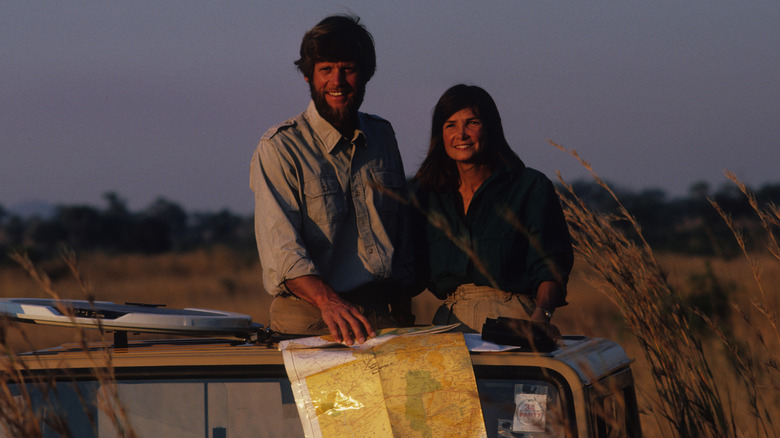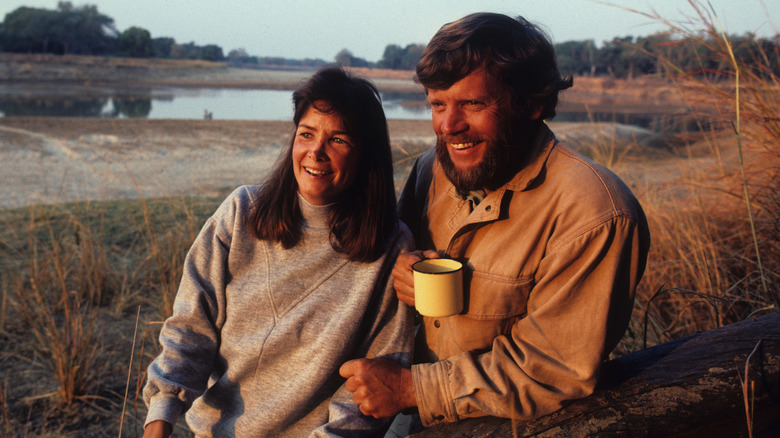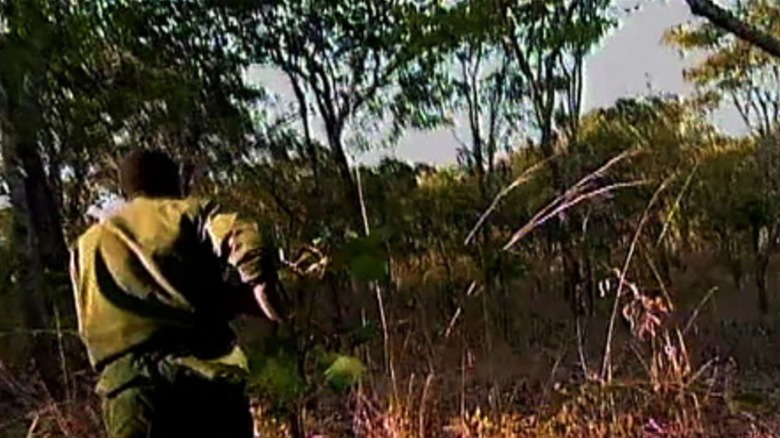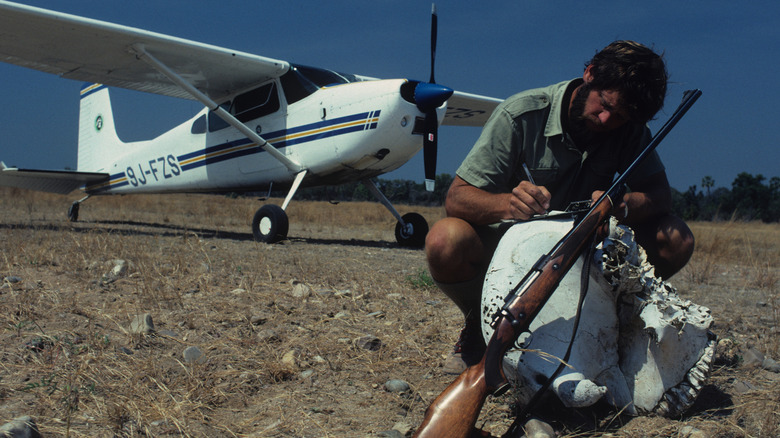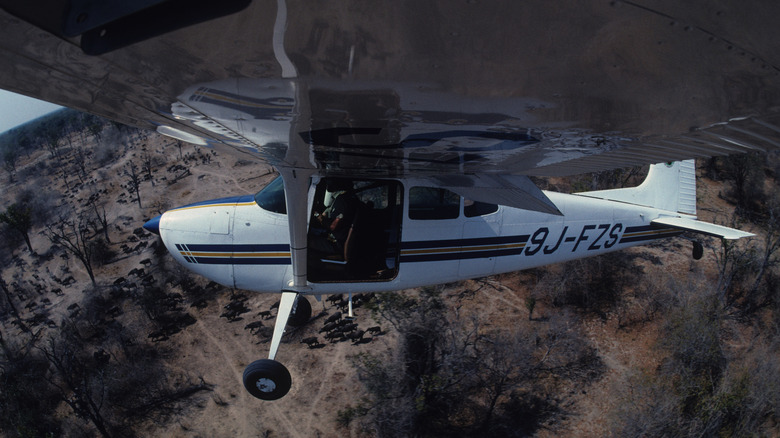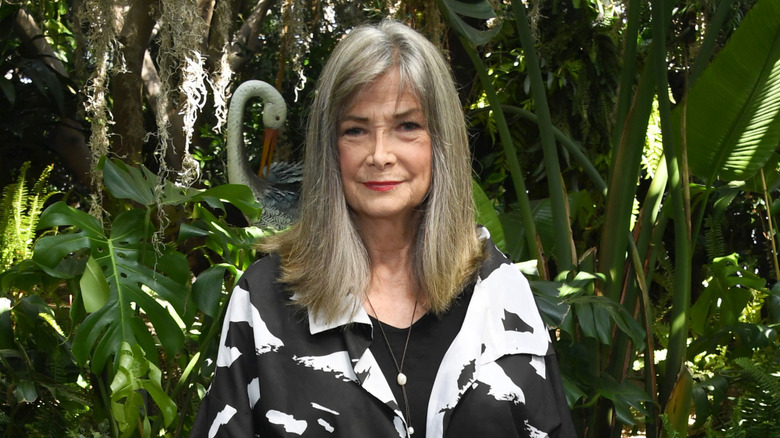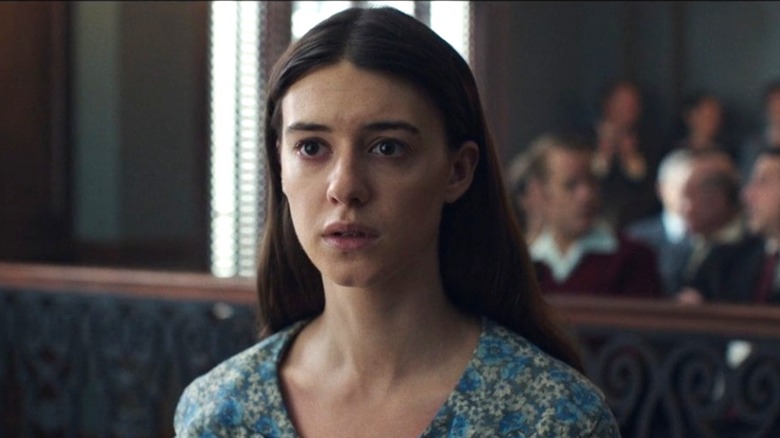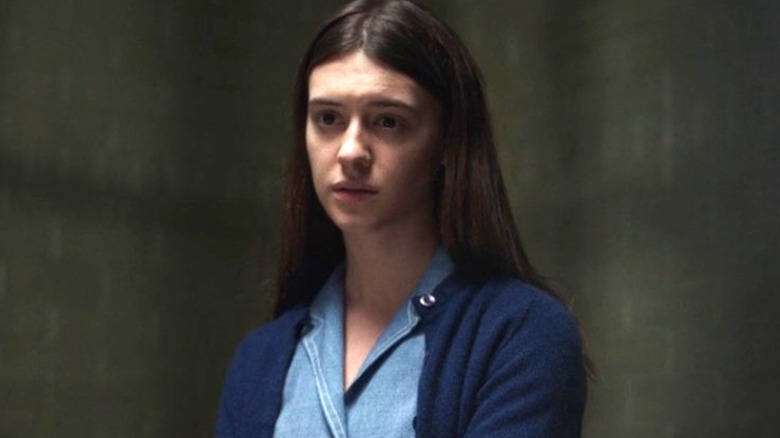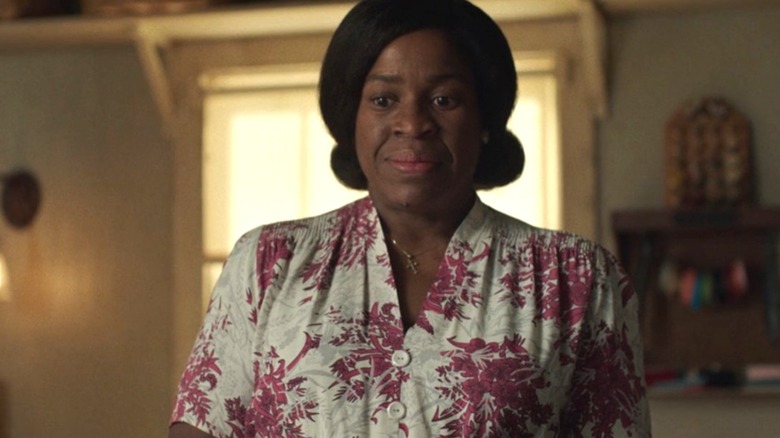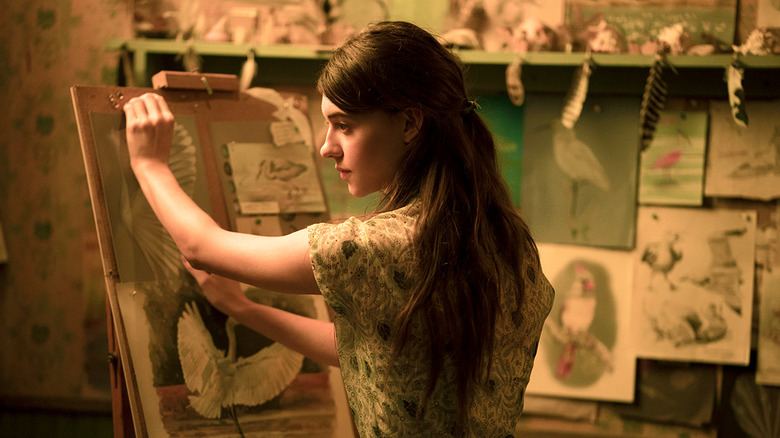Where The Crawdads Sing Controversy Explained
"Where the Crawdads Sing" is a best-selling murder mystery book published in 2018, and its success led to a movie adaptation through actress Reese Witherspoon's production company Hello Sunshine. Despite the rotten score from critics on Rotten Tomatoes, audiences loved it, giving the film 96% on the Popcornmeter. It wasn't one of the highest-grossing adaptations at the box office, but still netted $144 million worldwide.
Behind the success of the novel lingered a question surrounding the author. Delia Owens, a zoologist and conservationist, published the book at 70 years old after previously writing books about her time in Africa with her husband Mark Owens. The couple was known throughout the 1970s, 1980s, and 1990s for their conservation work in Botswana and Zambia, documenting wildlife behavior while working to protect animals from poachers. Their efforts culminated in the two being connected to the death of an alleged poacher that was caught on camera and televised across America in 1996.
Nearly three decades later, the controversy over the Owenses has spilled over into the zeitgeist for "Where the Crawdads Sing" because of the story the book tells. There are what some consider uncanny connections between the novel and the real-life death of an individual in Zambia that continue to come up. Here is the entire controversy of "Where the Crawdads Sing" explained, from the author's time in Africa to the press tour for the film adaptation.
The Owens couple lived in Africa
Delia and Mark Owens, then biologists in their 20s, moved to the remote deserts of Botswana in 1974. They created a research station in Deception Valley, studying brown hyenas and lions. The couple wrote and published articles about their research on animal behavior, landing funding that allowed them to continue their studies. One of their sponsors, the Frankfurt Zoological Society, even provided the Owenses with enough funds to purchase a small, single-engine plane. Mark learned to fly and utilized the plane in service of their research.
However, their time in Botswana eventually came to an end. The Owenses began to campaign for the protection of the wildebeest, whose migration path was hindered by a fence built by the government, causing restricted access to water and forcing them into poacher hunting areas. The fence was designed to protect one of the country's biggest exports, cattle, from foot-and-mouth disease, which was spreading throughout Zambia at the time.
While they attempted to work with local authorities and officials, the Owenses ultimately took their cause to the international stage in the hopes of having more sway over the Botswana government with higher-profile individuals. This backfired on them when the government requested a meeting, only to tell the couple they had to leave the country and not return. The decision was eventually reversed, but not before the couple used American politicians like then-vice president George H. W. Bush to fight on their behalf.
They later moved to Zambia
While using their resources to fight the decision of the Botswana government, Delia and Mark Owens looked for other ways to continue their research in Africa. In 1986, they moved to the area of North Luangwa National Park in Zambia. Though an established national park, there was a significant amount of poaching activity, particularly with elephants.
The couple set up their new station near an evacuated village and began aiding the local community so those individuals wouldn't work for poachers. In some villages, the couple developed communal resources like fish ponds in exchange for them working with them against the poachers. In addition to assisting local villages, they also provided important supplies to the scouts designated to protect the park. Poachers were typically well-armed and well-stocked, while scouts were not. The Owenses sought to remedy that by providing new boots and sleeping bags and consistent food and income. They also trained the scouts.
Despite their efforts, poachers continued to be an issue for North Luangwa National Park and the surrounding areas. Things escalated when poacher Bernard Mutondo, who had a commercial business, called for the killing of the couple. This caused Mark to increase deterrent efforts, using their small plane to fly over poacher camps and scare them away with "cherry bombs" shot from a shotgun. He found success with the method, and continued to use it as he discovered new camps.
An alleged poacher died in Zambia
While shooting a special for ABC in 1996, a camera crew caught the fatal shooting of an alleged wildlife poacher on tape. The crew was there to film the Owenses, who received more attention after their book, "The Eye of the Elephant," released in 1992. The intent was to create a segment for ABC's series "Turning Point" on elephant poaching, but the cameras captured something else entirely.
ABC aired "Deadly Game: The Mark and Delia Owens Story" on March 30, 1996. The hour-long episode showed what their life looked like, while also displaying the violence around poaching. As the scouts come up onto a campsite, the cameras document someone returning to the area. The individual is shot, but the special does not establish who did it. The footage continues as the injured person tries to move before three more shots ring out. It is not confirmed if the person killed was a poacher. The sequence is a small portion of the television special. It continues on, with Mark explaining that what audiences just watched is an unfortunate reality of those on opposite sides of poaching. "It's people who make it ugly," Mark says to Meredith Vieira, the chief correspondent for "Turning Point" at the time, about the situation.
The identities of everyone on screen are obscured. As documented by Jeffrey Goldberg for The New Yorker, "the execution of the alleged poacher is not mentioned in the remaining twenty-five minutes of the broadcast." ABC makes no mention of trying to identify the individual who was killed or if they were involved with poachers.
The Zambian police investigated the death
The Zambian government saw the episode in the summer of 1996. There was concern over how Zambia was presented, and the country's police force launched an investigation into the alleged poacher's death. Efforts stalled quickly as the producers, crew, cameramen, and other individuals associated with ABC who witnessed the shooting weren't in the country and could not be interviewed, and the Owenses left in September 1996. The couple's departure came after the Zambian government saw the "Turning Point" special. With the Owenses gone and no body, officials seized the property at the couple's research stations.
Both ABC and the Owenses argued that there was a known shoot-to-kill policy set forth by the Zambian government. In a letter written to their donors, as documented by The New Yorker, the Owenses wrote that "the 'shoot to kill policy' is only used by Zambian government Game Scouts in self defense. It is NOT a policy of our project." At a different time, the couple said that the former tourism minister Christon Tembo confirmed that poachers could be shot by scouts. This conversation took place just before the ABC crews arrived in Zambia. As researched by Jeffrey Goldberg, there was not a written law stating poachers could be shot, and there are documented cases of scouts being punished for shooting poachers.
The Owenses were allegedly involved in the death
The Owenses maintain that they were not associated with the alleged poacher's death. In letters written to their donors, the Zambian attorney general, and various statements, the couple says they were not present at the time of the shooting. "We don't even know where that event took place," Delia told Jeffrey Goldberg when he visited their property in Idaho. They also said that Mark, though responsible for helping to train scouts, did not command them to perform certain actions. Individuals in Zambia who spoke with Goldberg during his research for The New Yorker stated otherwise. "Mark Owens said we had to do anything to stop them, or else the elephants would all die," former scout Mutale Kasokola said.
The ABC cameraman that captured the footage, Chris Everson, spoke with Goldberg about what he witnessed at the time. After Mark Owens took his son Christopher, Chris Everson, and a scout by airplane to a location within the park, the trio stumbled upon the campsite. When the alleged poacher appeared, it was Christopher who shot them. "I don't know what was going on in Chris's mind," Everson said. "He had a rush of blood to the head. I don't know why he shot him in the first place. I don't." The scout fired a shot, the first in the footage, before Christopher fired the final three. Requests for the uncensored footage from ABC have not yielded results that could confirm or deny Christopher's involvement. Many parties cite a confidentiality agreement with the Owenses as the reason why people are blurred in the footage, but the couple denies this.
While speaking with Goldberg, Deborah Amos, the on-camera reporter for the project, detailed that Andrew Tkach, the field producer, discussed what happened with her as they continued their trip. "Andrew said after all this, 'Mark's son killed somebody,'" Amos said. "I was shocked that he didn't tell me they filmed a murder."
The Zambian police want to speak with Delia Owens
The Zambian police investigating the death believe Mark Owens moved the body. The "Turning Point" special mentions that killed poachers are typically left as food for the animals. Biemba Musole, a Zambian detective, told Jeffrey Goldberg that, based on his investigation, Mark returned to the area with scouts, who helped him place the body in a net, and then he flew a helicopter to move the body into a lake.
Based on their investigation, the Zambian police wanted to speak with the Owenses. Musole hoped to travel to the United States to interview them and the members of the ABC crew, but they didn't have the budget for that. Lillian Shawa-Siyuni, Zambia's director of public prosecutions in 2022, confirmed that all three members of the Owens family were still wanted for questioning regarding the case. "There is no statute of limitations on murder in Zambia," Siyuni said, as documented by Time. "They are all wanted for questioning in this case, including Delia Owens."
The family has not returned to Zambia since they left in September 1996. At the advice of the United States Ambassador to Zambia at the time, Roland Kuchel, they did not return in the short term while the investigation was ongoing. Kuchel told Goldberg that he was concerned with the corrupt nature of the justice system in Zambia and feared for Mark's safety should he be imprisoned there. Mark and Delia have since settled in Idaho.
Where the Crawdads Sing has an eerily familiar story
When Delia Owens published "Where the Crawdads Sing," readers familiar with the Zambian case couldn't help but notice the similarities between the two. The book follows Kya (Daisy Edgar-Jones), a woman living in the marshes of North Carolina. Told over two timelines, Kya's childhood and her adulthood are explained as she goes to trial for the murder of Chase Andrews (Harris Dickinson), a well-known man in town she was romantically involved with at one point.
While the Owenses have not been on trial, they have been accused by multiple people and the Zambian government of being involved with the alleged poacher's death. In the book, Kya is considered a suspect from the beginning because she lives in the marsh and there are witnesses that heard her threaten to kill Chase after he attacked her. In the Owens' case, there are several people that claim to have witnessed Mark's son Christopher firing toward the individual before the cameras capture what happens next.
The general story of an unsolved murder and the attention Kya receives for it, even after she is found not guilty by the justice system, mirrors that of Delia Owens. There is an unsolved murdered of an alleged poacher in Zambia that she and her family are connected to. If they were to return to Zambia, they would be detained for questioning at minimum. It came across to those familiar with the case that Owens was loosely writing about her own life, though she has not confirmed that.
Does Kya get away with murder in the book?
Kya is found not guilty for the murder of Chase Andrews and life moves on. She and Tate (Taylor John Smith), her romantic interest, live out in the marsh, creating a life together before Kya dies at 64 years old. As Tate looks for any documents that he may need, like a will, he finds a box hidden away. Inside, there are material possessions and poems written by Kya. One poem seems to reference Chase's murder, discussing female fireflies and how they lure male insects to their deaths. The box also contains Chase's shell necklace, which he was wearing the night of the murder.
These combined elements suggest that, though she was found not guilty in a court of law, Kya did kill Chase. Tate can't confirm without a doubt that the poem is referencing Chase's death, but the implication of it combined with having the necklace in her possession leaves little to question. She took the secret to her grave, only for Tate to maintain that for her by burning the poems and disposing of the necklace in the marsh.
The revelation after her death that Kya was likely responsible for Chase's murder is seen as a parallel to those familiar with the Zambian case. Delia Owens published the book at 70 years old. Though older than Kya, the connection of seemingly admitting to something in her later years, especially something she may have gotten away with, has caused unanswered questions in "Where the Crawdad Sings." Is there a biographical nature to the end of Kya's story?
There are concerns on the depiction of African Americans in the book
In addition to the controversy surrounding the author's time in Africa, there are concerns about how she portrays African American characters in "Where the Crawdads Sing." Brianna O'Reilly wrote for The Black Project that the two major African American characters, Jumpin' and his wife Mabel, embody two major stereotypes used to craft Black characters: the Magical Negro and the Mammy, respectively. The former refers to a Black character, typically in a supporting role, whose purpose is to help the white protagonist. The latter is a Black woman in a motherly role, based on the work of Black women in American households as slaves.
In his work for The New Yorker, Jeffrey Goldberg discusses how the Owenses spoke and wrote about the African people they lived around for over two decades, setting an uncomfortable precedent for the treatment of the characters in her book. "The Owenses' writings on occasion convey archaic ideas about Africans," Goldberg writes. He cites that, at the time of writing "The Hunted," their foundation website referred to Africa as "the Dark Continent." In their books, the couple refer to ideas like "an Eden-like Africa" and discuss population control on the continent. "Their whole attitude was 'Nice continent. Pity about the Africans,'" Mark Harvey, a safari guide who previously worked with the Owenses before falling out, said to Goldberg.
While writing for Slate, Laura Miller discussed how the scene when Jumpin' wants to report Chase attacking Kya to the police "betrays a profound racial and historical ignorance." The idea that an African American of his age, living in the South in the 1960s, would want to go to the police doesn't make sense, considering the history of the country and region. The lack of care shown to the characters further represents the ideas presented by the Owenses in their non-fiction books, from utilizing harmful stereotypes to ignoring cultural history.
The movie couldn't shake the controversy
During the press tour for the adaptation, those who asked about the alleged poacher's death saw repercussions. TIME reports that, after asking the movie's screenwriter Lucy Alibar about the case, their interviews with Daisy Edgar-Jones, Reese Witherspoon, Delia Owens, and director Olivia Newton were canceled by a representative for Sony.
Those associated with the movie were also included in the discourse. Musician Taylor Swift wrote the original song "Carolina" for the adaptation, receiving multiple nominations for it, including a Grammy nomination for best song written for visual media and a Golden Globe nomination for best original song. Her involvement with "Where the Crawdads Sing" raised questions on social media as people read more about Delia Owens, even sparking Reddit threads on what people thought. Redditor falldiewakefly called it "Six Degrees Of Controversy," while user supersoot99 wrote "it would be naive to say she's not aware that she's working with (or in this case, on a project associated with) people with incredibly problematic pasts and/or views," showing the mixed thoughts on the topic. There was similar discourse surrounding Taylor Swift's role in the film "Amsterdam," directed by David O. Russell.

